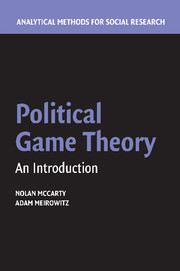Book contents
- Frontmatter
- Contents
- Acknowledgments
- 1 Introduction
- 2 The Theory of Choice
- 3 Choice Under Uncertainty
- 4 Social Choice Theory
- 5 Games in the Normal Form
- 6 Bayesian Games in the Normal Form
- 7 Extensive Form Games
- 8 Dynamic Games of Incomplete Information
- 9 Repeated Games
- 10 Bargaining Theory
- 11 Mechanism Design and Agency Theory
- 12 Mathematical Appendix
- Bibliography
- Index
2 - The Theory of Choice
Published online by Cambridge University Press: 05 June 2012
- Frontmatter
- Contents
- Acknowledgments
- 1 Introduction
- 2 The Theory of Choice
- 3 Choice Under Uncertainty
- 4 Social Choice Theory
- 5 Games in the Normal Form
- 6 Bayesian Games in the Normal Form
- 7 Extensive Form Games
- 8 Dynamic Games of Incomplete Information
- 9 Repeated Games
- 10 Bargaining Theory
- 11 Mechanism Design and Agency Theory
- 12 Mathematical Appendix
- Bibliography
- Index
Summary
Much of political game theory is predicated on the idea that people rationally pursue goals subject to constraints imposed by physical resources and the expected behavior of other actors. The assumption of rationality is often controversial. Indeed one of the most lively debates in the social sciences is the role of rationality and intentionality as a predictor of behavior. Nevertheless, we omit the debate between Homo economicus and Homo sociologicus and jump immediately into the classical model of rational choice.
For almost all of our purposes, it is sufficient to define rationality on a basis of two simple ideas:
(1) Confronted with any two options, denoted x and y, a person can determine whether he does not prefer option x to option y, does not prefer y to x, or does not prefer either. When preferences satisfy this property, they are complete.
(2) Confronted with three options x, y, and z, if a person does not prefer y to x and does not prefer z to y, then she must not prefer z to x. Preferences satisfying this property are transitive.
Roughly speaking, our working definition of rational behavior is behavior consistent with complete and transitive preferences. Sometimes we call such behavior thinly rational, as properties 1 and 2 contain little or no substantive content about human desires. Thin rationality contrasts with thick rationality whereby analysts specify concrete goals such as wealth, status, or fame.
- Type
- Chapter
- Information
- Political Game TheoryAn Introduction, pp. 6 - 26Publisher: Cambridge University PressPrint publication year: 2007



